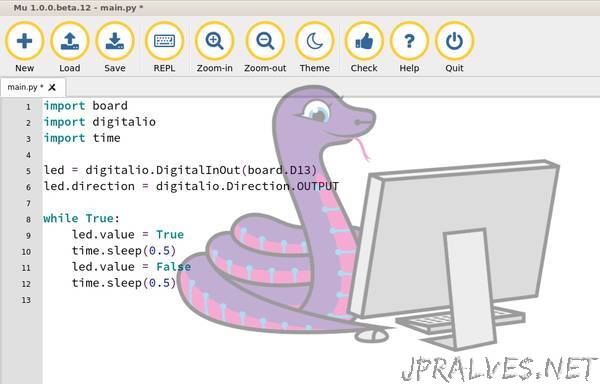
“Fresh for the 2018 New Year, we are pleased to announce the release of CircuitPython 2.2.0 !
Here’s the GitHub release page.
Installation
To install follow the instructions in our new Welcome to CircuitPython! guide. To install the latest libraries, see this page in that guide.
Try the latest version of the Mu editor for creating and editing your CircuitPython programs and for easy access to the CircuitPython serial connection (the REPL).
All builds except ESP8266 are available as both UF2 and bin files here along with test builds.
Changes since 2.1.0
Frozen modules in the Circuit Playground Express builds are updated to their latest releases (including tap support on LIS3DH). The frozen modules include library version info in <module>.version.
round() was always returning 0. Fixed to return correct value.
CircuitPython now writes out version information to boot_out.txt, before boot.py runs when you hard-reset the board or plug it in.
Intermittent power (e.g., bobbling the battery connector) could cause CircuitPython to think that the CIRCUITPY filesystem was damaged and erase it. Now, it waits two seconds before erasing, and double-checks just before erasing to see if filesystem still appears to be damaged.
audiobusio.PDMIn: MEMS microphone support is much improved. (There is a MEMS microphone on the Circuit Playground Express.) We fixed several bugs that could cause hard crashes. The minimum and default sampling frequency is now 16 kHz (16000). The microphone is clocked all the time to avoid having to wait for it to start up, which can take up to 0.1 seconds. When you first create a PDMIn object, CircuitPython waits for startup_delay seconds (default 0.11 seconds) so that the first data from the microphone will be useful. The digital filter used to convert microphone data into PCM data is now much faster. Thanks @ladyada!
busio.SPI now has an additional operation SPI.write_readinto() which does bidirectional input/output. Certain SPI devices use this technique for communication.
Allow zero-length reads and writes for busio.SPI. busio.I2C still disallows empty reads. Thanks @deshipu!
AnalogIn.value is now much faster. It now uses the native 12-bit ADC resolution instead of doing 16-bit via oversampling. Range is still 0-65535. Also uses a faster clock rate.
microcontroller.on_next_reset(): Change the behavior of what happens when the reset button is pressed: whether a normal reboot occurs, whether to go into safe mode, or whether to go directly to the bootloader. See microcontroller.RunMode.
Add missing Feather M0 Adalogger pin names and correct documentation. Thanks @stewmystre!
Fix Arduino bootloader support so that a 1200 baud reset will be noticed and Arduino IDE will be able to upload.
Enable framebuf module in ESP8266 port. Thanks @jerryneedell!
Add _stage module, to support the CircuitPython Stage game library. Gracefully reset gamepad module after soft reset. Add board definition for the uGame handheld console. Thanks @deshipu!
Add support for future products. Thanks @ladyada!
Update USB PID for Feather M0 Express.
Add board definition for Feather M0 Express with larger SPI flash chip. Thanks @dastels!
Document resetting CIRCUITPY using flash erase programs and .uf2’s.
Improve readthedocs documentation generation.
Documentation
Documentation is available in readthedocs.io.
Here are all the changes since 2.1.0.
This release is based on MicroPython 1.9.2. Support upstream MicroPython by purchasing a PyBoard (from Adafruit here).”
